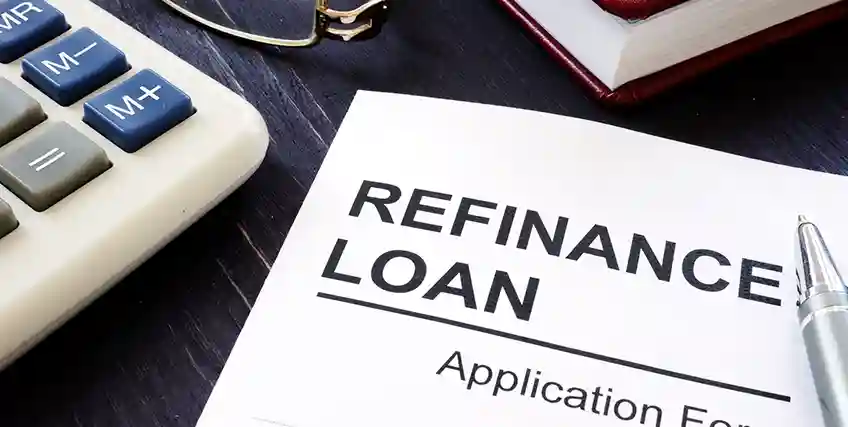How to Turn Loan Rejection Into a Funding Strategy With Bad Credit
July 14, 2025 | Last Updated on: July 14, 2025

If you've been rejected for business loans with bad credit, you're not alone and you're not out of options. For many small business owners, especially those with limited credit history or low scores, a loan denial feels like a shutdown. But in reality, it's a signal to recalibrate, not retreat.
According to the Federal Reserve’s 2023 Small Business Credit Survey, over 40% of owners with subprime credit were denied funding applications. That stat might sound discouraging, but it tells a bigger story: a rejection doesn’t mean you can’t access capital. It means you need a more strategic approach to find a business loan that fits your current financial profile.
In this guide, we’ll break down how to respond to rejection, rebuild your credit standing, and explore alternatives like revenue-based financing or merchant cash advances. You'll learn how to analyze your current financials, improve your cash flow profile, and position yourself for approval, even if you’ve been told “no” before.
Whether you're applying for your first business loan for small business with no credit, or you’re looking to recover from past denials, this roadmap is for you.
Why Traditional Lenders Say No
If your FICO score is below 580, banks typically view your business as a high-risk borrower. With business loans with bad credit, traditional lenders often reject applications outright. Negative marks like missed payments, bankruptcies, or even too many recent credit inquiries can drag down your personal credit score - one of the first things banks look at.
1. Low Credit Score
If your personal credit score is below 600, most traditional lenders won’t even consider your application. They view poor credit as a red flag that you may default on the loan. When it comes to business loans with bad credit, your credit report is the first wall you’ll hit.
2. Unstable Cash Flow
Banks want assurance you can repay what you borrow. If your monthly revenue swings wildly or if you can’t show consistent profits, it’s a dealbreaker. Weak financials make you a risky borrower.
3. Too Much Existing Debt
If your business already carries multiple debts or high balances on business credit cards, lenders worry about your repayment capacity. A high debt-to-income ratio can disqualify you even if your revenue is solid.
4. Incomplete Documentation
Whatever you do, ensure you submit complete documentation or else it can lead to immediate rejection. So, get your tax returns, profit-and-loss statements, or cash flow records in order and submit them carefully because most institutions won’t even chase down missing files; they’ll just move on.
And the surprising fact is that it's not only the new businesses or businesses with limited credit history that face rejection. Even strong and established businesses get rejected for reasons beyond their control. If you can understand why, you can come up with smarter ways to access business loans with bad credit.
Keep in mind that rejection doesn’t mean your business is doomed. It just means your file didn’t meet their requirements. It can be fixed.
What to Do Right After Rejection
Getting denied for business loans with bad credit isn’t the end of the road; it’s the beginning of your recovery plan. What you do next can make or break your next application.
1. Pull All Credit Reports
Start by visiting AnnualCreditReport.com to request free credit reports from Equifax, Experian, and TransUnion. Review them carefully. Look for errors, outdated accounts, or fraudulent activity. Dispute any inaccuracies. A clean and accurate credit history gives you a stronger shot the next time you apply.
2. Review Your Cash Flow
Use tools like QuickBooks or Wave to build detailed cash flow statements. These documents should show how money enters and exits your business. The stronger your numbers look, the easier it is to make a case for business loans with bad credit.
3. Audit Your Debt
List out all current debts, including interest rates, balances, and monthly payments. Aim to pay down smaller balances if possible. This improves your debt-to-income ratio, a metric many lenders rely on when evaluating risky applications.
4. Know Your Burn Rate
How fast does your business spend cash? This “burn rate” shows how long you can operate without new funding. Including this in your business plan makes you look prepared and lowers lender risk.
Each of these steps helps rebuild credibility and prepares you to apply with confidence.
Rebuild Your Financial Profile
If you’ve been denied business loans with bad credit, rebuilding your financial foundation is your next move. You don’t need perfect credit, just enough improvement to shift your risk profile in a lender’s eyes.
1. Raise Your Credit Score
Start by lowering your credit utilization ratio, aim for below 30%. Set up automatic payments to avoid missing due dates. Also, avoid new hard inquiries unless absolutely necessary. Every point you gain matters when applying for business loans with bad credit.
2. Add a Co-Signer or Personal Guarantee
Bringing in a co-signer with stronger credit can be a really good option for your loan application if your personal or business credit is not up to the mark. This step can open up a variety of loan products that you wouldn't qualify for alone. Personal guarantees also build lender's confidence in your application as it shows you are committed.
3. Ask for Less
If you are unable to secure a loan for a larger amount, try requesting for a smaller amount. This is so because small loan amounts are perceived as low risk. A lot of lenders who offer business loans with bad credit prefer starting with smaller amounts to check your repayment ability.
4. Strengthen Your Business Plan
Revamp your business plan with clear revenue forecasts, expense tracking, and repayment strategies. Lenders want to see that you’ve done your homework and that their money will be repaid.
Each step builds trust and brings you one step closer to approval.
Explore Non-Traditional Funding Options
Securing a business loan with bad credit is not an easy task, especially when it comes to traditional banks. That's why it is often suggested that applicants explore other options too. Nowadays, there are many lenders who specialize in business financing options with bad credit, using different approval methods. Though these financing options offer fast funding and easy accessibility, keep in mind the cost of it all. These financing products often carry high costs in form of high interest rates and other hidden fees. So, ready thoroughly and consult a financing expert, before making any decision.
1. Online Lenders
Fintech platforms assess more than just your credit score. They often evaluate real-time revenue, bank activity, and customer payments. For entrepreneurs with inconsistent or low credit, these lenders are often the gateway to business loans with bad credit.
2. Merchant Cash Advances (MCAs)
MCAs provide upfront capital in exchange for a portion of your future sales. While interest rates are steep, approval is fast, and your credit score takes a back seat. Businesses with strong daily transactions like retailers may benefit.
3. Invoice Factoring
You can sell unpaid customer invoices to factoring companies and get a portion of the cash upfront. This isn’t a loan, but it does improve cash flow without taking on new debt.
4. Revenue-Based Financing
This model ties repayments to your estimated future receivables. It’s one of the more flexible options for business loans with bad credit.
Apply the Right Way
You’ve cleaned up your credit reports, improved your documentation, and explored your options. Now it’s time to reapply, but this time, with a strategy that’s tailored for success. Many business owners seeking business loans with bad credit rush into applications without preparation. That’s a mistake you can avoid.
Start by ensuring your credit report is as accurate as it can be. If you spot inaccuracies, immediately file disputes with three major bureaus - Equifax, Experian, and TransUnion. Because even the slightest error can lead to rejection - something that you would want to avoid. And reporting inaccuracies to credit bureaus can raise your score over time.
Next on the list is to organize your documents. Lenders that offer business loans with bad credit are very thorough and careful as they want to avoid any defaulters. So, they would want to check your bank statements, revenue records, and business plan. For any lender, clear and current financials are an indicator that you're serious and can repay on time.
Don’t apply to every lender at once. Each application may trigger a hard inquiry, which can hurt your score further. Instead, research lenders who work with bad credit and use prequalification tools whenever possible.
There are websites that match borrowers to lenders based on financial health and not just credit scores. These platforms can help you find targeted business loans with bad credit instead of forcing you into a one-size-fits-all product.
Finally, tailor your application to the lender’s terms. If they focus on cash flow, highlight yours. If they prefer collateral, be ready to offer assets. The more customized your pitch, the better your approval odds.
Is This the Right Time to Borrow?
Before you submit your applications for business loans with bad credit, you need to take a breath and ask yourself whether this is the right time for your business to take on debt? Just because you can get approved for a business loan doesn't mean you should borrow. It can be a debt trap waiting to happen. You need to think about all the additional costs that you would have to bear. You know that borrowing on weak or damaged credit comes with higher interest rates, shorter repayment terms and stricter loan conditions. All of these aspects make timing and strategy very critical.
You can get the answer to this question by reviewing your business's monthly revenue and expenses. Check whether your cash flow can realistically support a new loan. If your business's income is seasonal or unpredictable, you may struggle with fixed payments.
Next, consider what you’ll use the money for. Will this loan fund a revenue-generating project, like marketing, inventory expansion, or new contracts? If not, the return might not justify the cost. Smart borrowing means every dollar has a clear job.
Also, reflect on external factors. Is your industry growing or shrinking? Are costs rising due to inflation or supply chain issues? These trends affect your repayment ability. If your business isn’t yet stable, it might be better to delay and continue strengthening your financial profile.
Finally, weigh alternatives to business loans with bad credit. You might raise money through crowdfunding, seek grants from local agencies, or apply for a microloan or line of credit with more manageable terms.
Taking out a loan should move your business forward, not add stress. If the numbers don’t align, wait. Building a stronger foundation now could mean better options later.
Conclusion
Getting turned down for business loans with bad credit may sting, but it’s far from the end of your funding journey. In fact, it’s often the first step toward building a smarter, more resilient business. Every “no” gives you critical insights: where your credit stands, what lenders expect, and how your business is really performing.
Instead of applying over and over again with no plan, pause and realign. Fix credit report errors. Track and improve your cash flow. Cut unnecessary expenses. Strengthen your business plan. These small wins build confidence with lenders and within yourself.
Alternative lenders, merchant cash advances, invoice factoring, and revenue-based financing are no longer just last resorts. They’re flexible tools for business owners with imperfect credit who need capital fast. And while they may come with higher costs, using them wisely can help bridge the gap between rejection and long-term stability.
If now’s not the right time to borrow, use this season to get financially fit. Focus on low-cost growth strategies. Explore grants and community lending programs. Build trust with local vendors and boost your business’s reputation.
Remember: securing business loans with bad credit isn’t about finding a shortcut. It’s about building the right path. With preparation, persistence, and the right funding strategy, you can move from denied to approved—and from surviving to thriving.
FAQs on Funding Strategy to Get Business Loans with Bad Credit
1. How do I improve my chances of loan approval with bad credit?
Fix credit report errors, pay down debt, build cash flow, and customize your application to each lender’s criteria. Even small improvements help.
2. Can I get a startup loan with bad credit?
Consider co-signers, small loan amounts, or using personal assets as collateral to increase your chances.
3. Do I need collateral for a bad credit business loan?
Some lenders offer unsecured loans based on revenue. But offering collateral can improve your approval odds and terms.
4. What’s the risk of bad credit loans?
High interest rates, short repayment periods, and daily withdrawal structures can strain your cash flow. Choose carefully and understand all terms upfront.
5. Will applying for multiple loans hurt my credit?
It might, if each application results in a hard credit inquiry. Use platforms that offer prequalification with soft pulls to avoid damage.
Frequent searches leading to this page
Term Loans are made by Itria Ventures LLC or Cross River Bank, Member FDIC. This is not a deposit product. California residents: Itria Ventures LLC is licensed by the Department of Financial Protection and Innovation. Loans are made or arranged pursuant to California Financing Law License # 60DBO-35839




